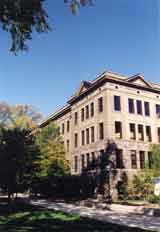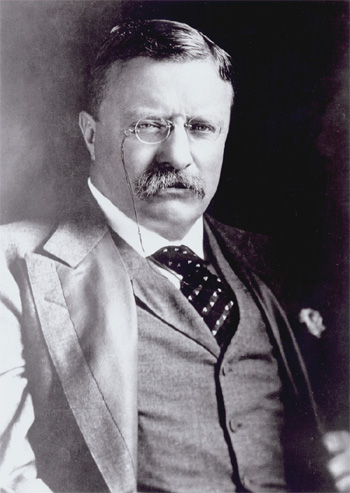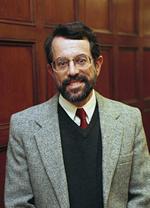|
Theodore Roosevelt Professorship in Ecosystem Management: Advancing Ecosystem Management studies at the School of Natural Resources & Environment
 The mission of the School of Natural Resources & Environment is to train leaders, develop policies and teach the skills necessary to manage and conserve the earth's resources on a sustainable basis. The school has been a pioneer in developing a scientific understanding of ecosystems, including their conservation, management and restoration and is, therefore, uniquely qualified to take on the interdisciplinary work necessary in this area. Its faculty and student expertise span three major academic concentrations: Resource Ecology and Management, Resource Policy and Behavior, and Landscape Architecture. The first program of its kind in the nation, founded in the late 1880s, the University of Michigan SNRE has been a leader in connecting science with natural resource and environmental policy and management for over 100 years. The mission of the School of Natural Resources & Environment is to train leaders, develop policies and teach the skills necessary to manage and conserve the earth's resources on a sustainable basis. The school has been a pioneer in developing a scientific understanding of ecosystems, including their conservation, management and restoration and is, therefore, uniquely qualified to take on the interdisciplinary work necessary in this area. Its faculty and student expertise span three major academic concentrations: Resource Ecology and Management, Resource Policy and Behavior, and Landscape Architecture. The first program of its kind in the nation, founded in the late 1880s, the University of Michigan SNRE has been a leader in connecting science with natural resource and environmental policy and management for over 100 years.
President Theodore Roosevelt
 President Theodore Roosevelt made conservation a central policy issue of his administration, creating national parks, wildlife and bird refuges, and the National Forest Service. He appointed an Inland Waterways Commission to investigate the condition of the nation's navigable waterways and to recommend measures for their protection and improvement. A rancher, big-game hunter, camper, and amateur entomologist, Roosevelt came to the presidency both well-schooled and disposed to protect the natural heritage of the nation. He advocated for the sustainable use of the nation's natural resources, the protection and management of wild game, and the preservation of wild spaces. In 1908, he called the governors of all the states to the White House Conference on Conservation, now regarded as the beginning of a true national conservation movement. Perhaps the greatest legacy of Roosevelt's efforts was his emphasis on conservation as an element of democracy: the resources of the public domain were to be used for the benefit of all people. It is fitting to have a professorship in ecosystem management named after President Roosevelt who did so much to invigorate and set the direction for the conservation movement in the United States. President Theodore Roosevelt made conservation a central policy issue of his administration, creating national parks, wildlife and bird refuges, and the National Forest Service. He appointed an Inland Waterways Commission to investigate the condition of the nation's navigable waterways and to recommend measures for their protection and improvement. A rancher, big-game hunter, camper, and amateur entomologist, Roosevelt came to the presidency both well-schooled and disposed to protect the natural heritage of the nation. He advocated for the sustainable use of the nation's natural resources, the protection and management of wild game, and the preservation of wild spaces. In 1908, he called the governors of all the states to the White House Conference on Conservation, now regarded as the beginning of a true national conservation movement. Perhaps the greatest legacy of Roosevelt's efforts was his emphasis on conservation as an element of democracy: the resources of the public domain were to be used for the benefit of all people. It is fitting to have a professorship in ecosystem management named after President Roosevelt who did so much to invigorate and set the direction for the conservation movement in the United States.
The Theodore Roosevelt Professorship in Ecosystem Management
The Theodore Roosevelt Professorship in Ecosystem Management was created as a result of a $1.2 million commitment from Sally B. and William L. Searle. The Searles decided to establish this professorship, the first such chair in the country, to advance knowledge and policy in an area of great importance to them and many others. Naming the professorship after President Roosevelt, an American who was one of the first to recognize the importance of the environment to America's citizenry and to its future, reflects the Searle's intent that the bold, effective and path-setting leadership Roosevelt offered in the conservation field during his lifetime should also be the qualities which characterize this professorship.
This professorship is intended to provide leaders in ecosystem management, ecosystem conservation, and ecosystem restoration, an area where the school already enjoys leadership standing. The first first such position in the United States, it will be used to establish linkage in these areas between public and private sectors and to affect the science, policy and management of ecosystems in this country and internationally. In order to provide flexibility and a dynamic focus on evolving topics, appointments shall be term appointments for periods of time appropriate to provide leadership on aspects of ecosystem management.
Current Theodore Roosevelt Professor
Michael J. Wiley: Associate Professor of Natural Resources: Aquatic Ecosystem Modeling
 Dr. Wiley's interests revolve around understanding ecological processes in aquatic systems of all types and the application ecological knowledge to practical problems of resource management. His research interests include ecology of rivers and lakes, watershed management, community dynamics and population regulation, trout stream food webs, behavioral adaptations of aquatic insects, fish invertebrate interactions, and fisheries management. Dr. Wiley teaches coursework in aquatic and stream ecology. He holds a Ph.D. in Natural Resources from the University of Michigan. Dr. Wiley's webpage contains additional information on research interests and courses he teaches. Dr. Wiley's interests revolve around understanding ecological processes in aquatic systems of all types and the application ecological knowledge to practical problems of resource management. His research interests include ecology of rivers and lakes, watershed management, community dynamics and population regulation, trout stream food webs, behavioral adaptations of aquatic insects, fish invertebrate interactions, and fisheries management. Dr. Wiley teaches coursework in aquatic and stream ecology. He holds a Ph.D. in Natural Resources from the University of Michigan. Dr. Wiley's webpage contains additional information on research interests and courses he teaches.
Past Recipients
Steven Yaffee: Professor of Natural Resources: Natural Resource Policy, Planning and Management
 Dr. Yaffee has worked for more than twenty years on federal endangered species, public lands and ecosystem management policy and is the author of Prohibitive Policy: Implementing the Federal Endangered Species Act (MIT Press, 1982) and The Wisdom of the Spotted Owl: Policy Lessons for a New Century (Island Press, 1994). He is a co-author of Ecosystem Management in the United States: An Assessment of Current Experience (Island Press, 1996) and Making Collaboration Work: Lessons from Innovation in Natural Resource Management (Island Press, 2000). His most recent work explores ecosystem management as a conceptual framework for managing natural resources, and multi-party, collaborative problem-solving efforts as necessary elements of an ecosystem approach. From 2002-2007, Dr. Yaffee served as the second Theodore Roosevelt Professor in Ecosystem Management. Dr. Yaffee received his Ph.D. in 1979 from the Massachusetts Institute of Technology in environmental policy and planning. He holds a B.S. in resource planning and conservation and a M.S. in natural resource policy from The University of Michigan. Before joining the SNRE faculty, he was a faculty member at the Kennedy School of Government at Harvard University, and has been a researcher at the Oak Ridge National Laboratory and the Conservation Foundation/World Wildlife Fund. Dr. Yaffee has worked for more than twenty years on federal endangered species, public lands and ecosystem management policy and is the author of Prohibitive Policy: Implementing the Federal Endangered Species Act (MIT Press, 1982) and The Wisdom of the Spotted Owl: Policy Lessons for a New Century (Island Press, 1994). He is a co-author of Ecosystem Management in the United States: An Assessment of Current Experience (Island Press, 1996) and Making Collaboration Work: Lessons from Innovation in Natural Resource Management (Island Press, 2000). His most recent work explores ecosystem management as a conceptual framework for managing natural resources, and multi-party, collaborative problem-solving efforts as necessary elements of an ecosystem approach. From 2002-2007, Dr. Yaffee served as the second Theodore Roosevelt Professor in Ecosystem Management. Dr. Yaffee received his Ph.D. in 1979 from the Massachusetts Institute of Technology in environmental policy and planning. He holds a B.S. in resource planning and conservation and a M.S. in natural resource policy from The University of Michigan. Before joining the SNRE faculty, he was a faculty member at the Kennedy School of Government at Harvard University, and has been a researcher at the Oak Ridge National Laboratory and the Conservation Foundation/World Wildlife Fund.
Thomas Crow
Dr. Thomas Crow was the first Theodore Roosevelt Professor in Ecosystem Management while serving as a visiting professor with SNRE in 1999 - 2001. Currently, Dr. Crow serves as a Supervisory Research Ecologist and Project Leader in the Forestry Sciences Laboratory at the USDA Forest Service North Central Forest Experiment Station, leading a program of research in landscape ecology.
|


 The mission of the School of Natural Resources & Environment is to train leaders, develop policies and teach the skills necessary to manage and conserve the earth's resources on a sustainable basis. The school has been a pioneer in developing a scientific understanding of ecosystems, including their conservation, management and restoration and is, therefore, uniquely qualified to take on the interdisciplinary work necessary in this area. Its faculty and student expertise span three major academic concentrations: Resource Ecology and Management, Resource Policy and Behavior, and Landscape Architecture. The first program of its kind in the nation, founded in the late 1880s, the University of Michigan SNRE has been a leader in connecting science with natural resource and environmental policy and management for over 100 years.
The mission of the School of Natural Resources & Environment is to train leaders, develop policies and teach the skills necessary to manage and conserve the earth's resources on a sustainable basis. The school has been a pioneer in developing a scientific understanding of ecosystems, including their conservation, management and restoration and is, therefore, uniquely qualified to take on the interdisciplinary work necessary in this area. Its faculty and student expertise span three major academic concentrations: Resource Ecology and Management, Resource Policy and Behavior, and Landscape Architecture. The first program of its kind in the nation, founded in the late 1880s, the University of Michigan SNRE has been a leader in connecting science with natural resource and environmental policy and management for over 100 years.  President Theodore Roosevelt made conservation a central policy issue of his administration, creating national parks, wildlife and bird refuges, and the National Forest Service. He appointed an Inland Waterways Commission to investigate the condition of the nation's navigable waterways and to recommend measures for their protection and improvement. A rancher, big-game hunter, camper, and amateur entomologist, Roosevelt came to the presidency both well-schooled and disposed to protect the natural heritage of the nation. He advocated for the sustainable use of the nation's natural resources, the protection and management of wild game, and the preservation of wild spaces. In 1908, he called the governors of all the states to the White House Conference on Conservation, now regarded as the beginning of a true national conservation movement. Perhaps the greatest legacy of Roosevelt's efforts was his emphasis on conservation as an element of democracy: the resources of the public domain were to be used for the benefit of all people. It is fitting to have a professorship in ecosystem management named after President Roosevelt who did so much to invigorate and set the direction for the conservation movement in the United States.
President Theodore Roosevelt made conservation a central policy issue of his administration, creating national parks, wildlife and bird refuges, and the National Forest Service. He appointed an Inland Waterways Commission to investigate the condition of the nation's navigable waterways and to recommend measures for their protection and improvement. A rancher, big-game hunter, camper, and amateur entomologist, Roosevelt came to the presidency both well-schooled and disposed to protect the natural heritage of the nation. He advocated for the sustainable use of the nation's natural resources, the protection and management of wild game, and the preservation of wild spaces. In 1908, he called the governors of all the states to the White House Conference on Conservation, now regarded as the beginning of a true national conservation movement. Perhaps the greatest legacy of Roosevelt's efforts was his emphasis on conservation as an element of democracy: the resources of the public domain were to be used for the benefit of all people. It is fitting to have a professorship in ecosystem management named after President Roosevelt who did so much to invigorate and set the direction for the conservation movement in the United States. Dr. Wiley's interests revolve around understanding ecological processes in aquatic systems of all types and the application ecological knowledge to practical problems of resource management. His research interests include ecology of rivers and lakes, watershed management, community dynamics and population regulation, trout stream food webs, behavioral adaptations of aquatic insects, fish invertebrate interactions, and fisheries management. Dr. Wiley teaches coursework in aquatic and stream ecology. He holds a Ph.D. in Natural Resources from the University of Michigan. Dr. Wiley's
Dr. Wiley's interests revolve around understanding ecological processes in aquatic systems of all types and the application ecological knowledge to practical problems of resource management. His research interests include ecology of rivers and lakes, watershed management, community dynamics and population regulation, trout stream food webs, behavioral adaptations of aquatic insects, fish invertebrate interactions, and fisheries management. Dr. Wiley teaches coursework in aquatic and stream ecology. He holds a Ph.D. in Natural Resources from the University of Michigan. Dr. Wiley's  Dr. Yaffee has worked for more than twenty years on federal endangered species, public lands and ecosystem management policy and is the author of Prohibitive Policy: Implementing the Federal Endangered Species Act (MIT Press, 1982) and
Dr. Yaffee has worked for more than twenty years on federal endangered species, public lands and ecosystem management policy and is the author of Prohibitive Policy: Implementing the Federal Endangered Species Act (MIT Press, 1982) and